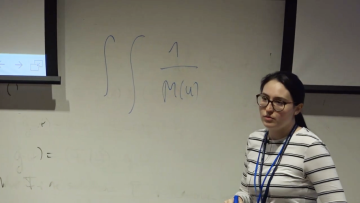The nonlinear stability of Kerr for small angular momentum
Abstract
I will report on my most recent results with Jeremie Szeftel and Elena Giorgi which conclude the proof of the nonlinear, unconditional, stability of slowly rotating Kerr metrics. The main part of the proof, announced last year, was conditional on results concerning boundedness and decay estimates for nonlinear wave equations. I will review the old results and discuss how the conditional results can now be fully established.
Implementing Bogoliubov transformations beyond the Shale-Stinespring condition
Abstract
Quantum many–body systems can be mathematically described by vectors in a certain Hilbert space, the so–called Fock space, whose Schroedinger dynamics are generated by a self–adjoint Hamiltonian operator H. Bogoliubov transformations are a convenient way to manipulate H while keeping the physical predictions in- variant. They have found widespread use for analyzing the dynamics of quantum many–body systems and justifying simplified models that have been heuristically derived by physicists.
In the 1960s, Shale and Stinespring derived a necessary and sufficient condition for when a Bogoliubov transformation is implementable on Fock space, i.e. for when there exists a unitary operator U such that the manipulated Hamiltonian takes the form U*HU. However, non–implementable Bogoliubov transformations appear frequently in the literature for systems of infinite size.
In this talk, we therefore construct two extensions of the Fock space on which certain Bogoliubov transformations become implementable, although they violate the Shale–Stinespring condition.
Erich Korngold was an Austrian-born composer who fled the Nazi regime for America where he made a living composing film music while also continuing to produce a range of 'classical' works.
This song is one of four songs about Shakespearean characters and plays, in this case Desdemona, ill-fated wife of the ill-fated Othello (it's a tragedy in case you were wondering),
Non-Invertible Symmetries from Discrete Gauging and Completeness of the Spectrum
Abstract
We study global 1- and (d−2)-form symmetries for gauge theories based on disconnected gauge groups which include charge conjugation. For pure gauge theories, the 1-form symmetries are shown to be non-invertible. In addition, being the gauge groups disconnected, the theories automatically have a Z2
global (d−2)-form symmetry. We propose String Theory embeddings for gauge theories based on these groups. Remarkably, they all automatically come with twist vortices which break the (d−2)-form global symmetry.





